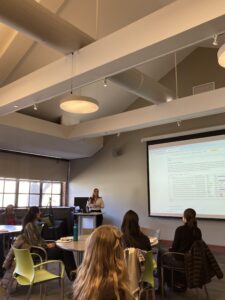During the summer of 2021, with the support of a Mellon Inclusive Pedagogy grant from the Center for Teaching and Learning (CTL), the Center for Hartford Engagement and Research (CHER) examined the experiences of students of color in community engagement programs at Trinity. As one response to the findings, CHER recently announced the Community Learning Faculty Toolkit, a compilation that includes resources on anti-racist community learning and Hartford history. The toolkit was launched on March 9, in conjunction with a faculty development event co-sponsored by CTL, which welcomed Dr. Tania Mitchell to lecture on critical service learning pedagogy.
The Community Learning Faculty Toolkit is a crowdsourced database of articles, books, online tools, and other resources that help faculty design community learning courses. The toolkit currently has two sections: one on anti-racist community learning, and one on teaching about Hartford’s history and present. Faculty can use the toolkit to enrich their own thinking and pedagogical planning, or they can choose readings to assign to their class.

The creation of the toolkit is one part of CHER’s ongoing work to advance commitments to diversity, equity, and inclusion. Professor Abigail Fisher Williamson, Director of CHER and Associate Professor of Political Science and Public Policy and Law, explains, “I became director of CHER in July 2020 following the police killing of George Floyd and mass protests against racial injustice. On our campus, the Umoja Coalition and the @BlackatTrin social media account highlighted racism at Trinity, and what could be done to address it. In a joint statement, the CHER team committed to ‘institutionalizing mechanisms for student leadership in CHER to better listen to the experiences of BIPOC and other marginalized students.’”
In response, in summer 2021, CHER conducted focus groups and interviews with students of color to learn about their community learning experiences at Trinity. Historically, higher education service learning pedagogy has too often assumed that community engagement involves white, privileged students from elite institutions engaging with people different from themselves in surrounding communities. However, this assumption ignores diversity within the student body, which can leave students of color feeling overlooked. Student research assistants Bea Dresser ‘22, Wendy Salto ‘22, and Renita Washington ‘22 conducted 41 interviews, including randomly selected students of color who were and were not participating in CHER programs.
While students of color engage in CHER programs at high rates and often report positive experiences, findings also suggested that students of color experienced discomfort navigating community learning courses. They noted the lack of confrontation with systemic racism in these classes, and more broadly at Trinity. To address this issue, CHER sought to create resources to support faculty in building anti-racist community learning courses. “We were inspired to work with faculty to think more concretely about what community learning looks like when it provides opportunities for all students to reflect on their identities, rather than centering the white student experience,” says Williamson.
To launch the toolkit and further our campus’s learning on inclusive community learning pedagogy, on March 9th, 2023, Trinity welcomed Dr. Tania Mitchell from the University of Minnesota to share a lecture titled “Challenging White Supremacy Culture in Community Engaged Learning.” Erica Crowley, Director of Community Learning, says that Mitchell’s work on critical service learning pedagogy was central to this project, notably her article “Service Learning as a Pedagogy of Whiteness.” In the talk, Dr. Mitchell used the characteristics of white supremacy culture in the workplace developed by Tema Okun to demonstrate ways to make community learning more inclusive. For example, Dr. Mitchell emphasized the importance of taking time to build partnerships, both in the planning stages of a course and during the semester.
Crowley announced the toolkit after Dr. Mitchell’s lecture, pointing to it as a resource for faculty in developing community learning courses. Mitchell also hosted a workshop where faculty could pose questions about how to apply principles of anti-racist community learning in their own courses. As the toolkit grows to include more sections, faculty are invited to email Erica Crowley with suggestions, questions, and resources to add.
